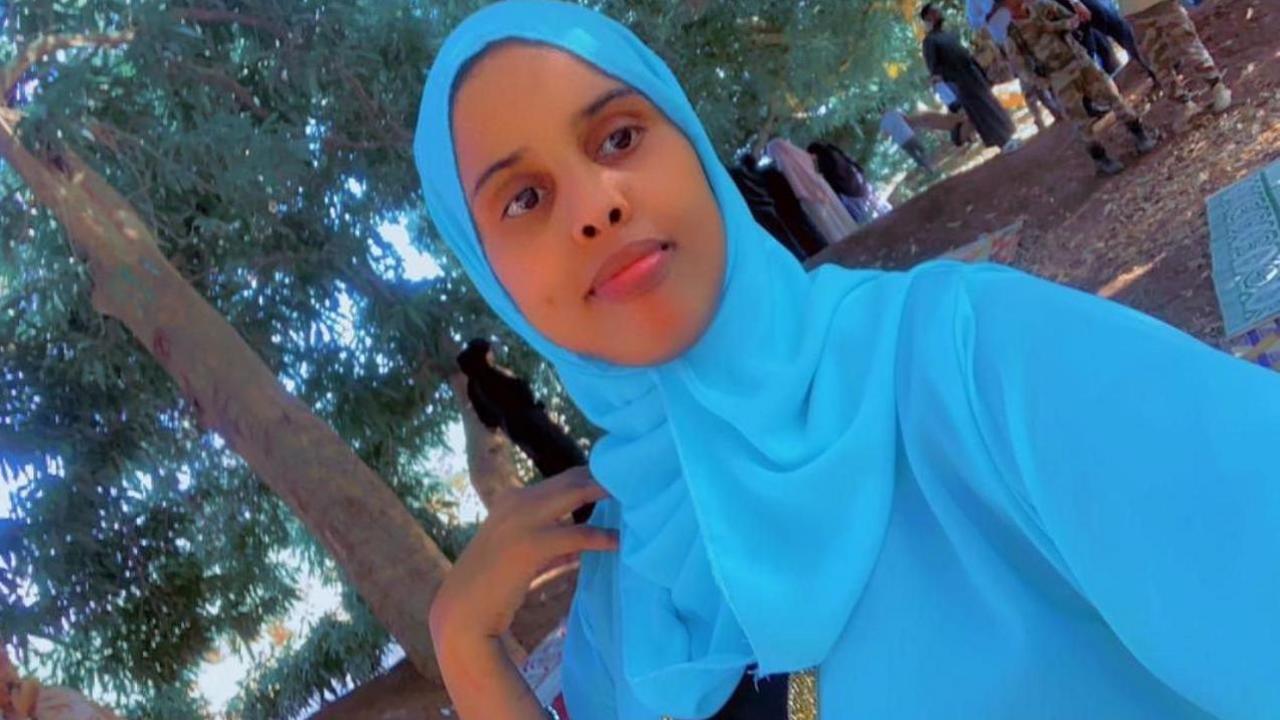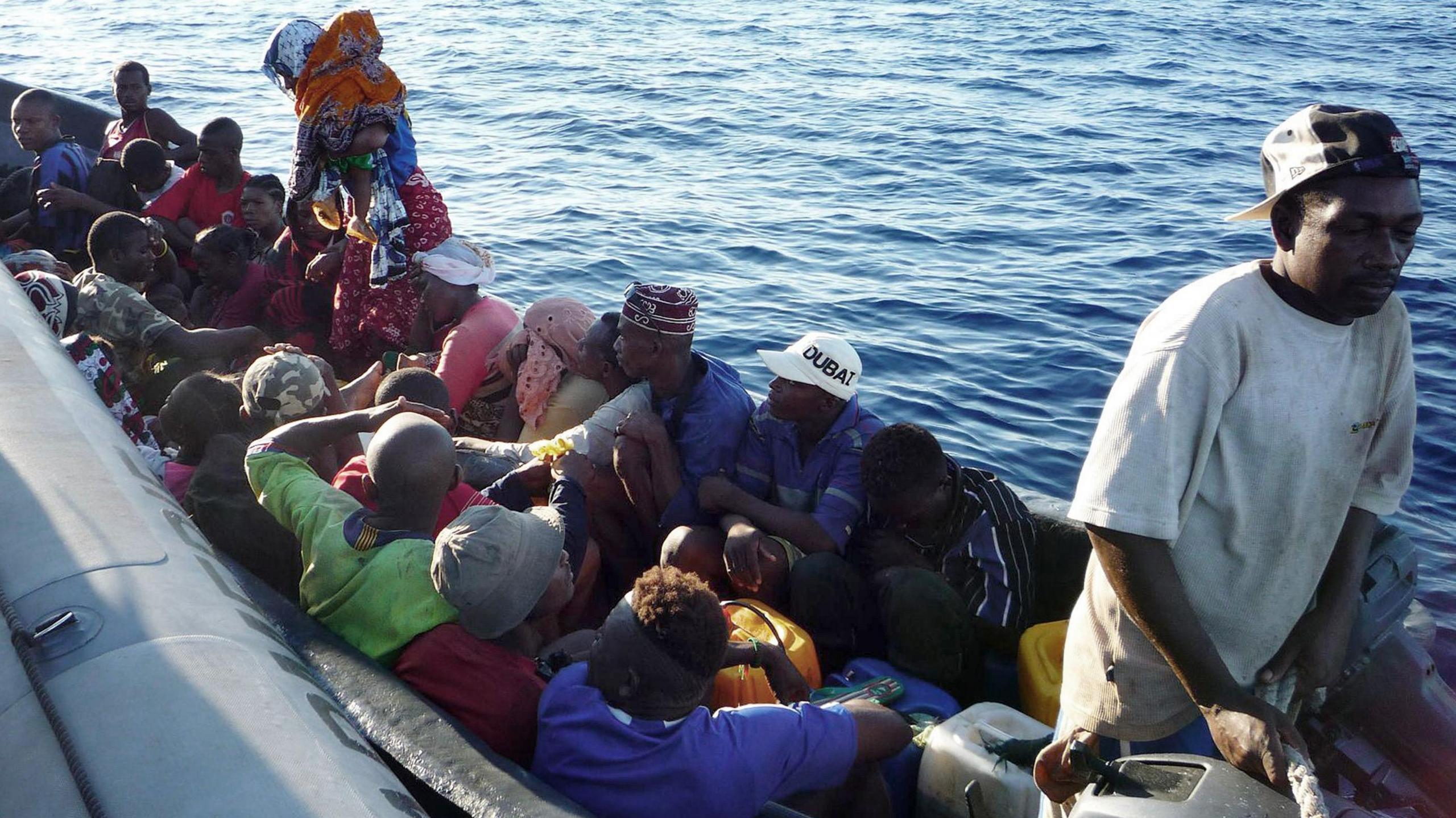'They threw her body into the ocean' - woman dies on boat headed for French island

- Published
The family of beauty-salon owner Fathi Hussein are deep in mourning at their home in Somalia's capital, Mogadishu, following her horrific death at sea after a deal she struck with migrant smugglers to take her to the French island of Mayotte went wrong.
"We were told by survivors that she died from hunger," the 26-year-old's stepsister Samira tells the BBC by phone.
The family learned from them that Fathi died in one of two small boats, adrift in the Indian Ocean for about 14 days, after being abandoned by the smugglers.
"People were eating raw fish and drinking sea water, which she refused. They [the survivors] said she started hallucinating before she died. And after that they threw her body into the ocean," Samira tells the BBC.
Fathi's family learned of her death from fellow Somalis who had been rescued by fishermen off the coast of Madagascar about a week ago.
The International Organization for Migration (IOM) said that more than 70 people were on the two boats when they capsized, claiming the lives of 24, while 48 survived.
Hundreds of migrants are believed to die each year trying to make it to the tiny French island, located about 300km (186 miles) north-west of Madagascar.
On 1 November, Fathi flew from Mogadishu to the Kenyan coastal city of Mombasa, and a few days later left by boat for Mayotte - a perilous journey of more than 1,100 km across the Indian Ocean.
Samira says they are baffled by Fathi's decision as she had a successful business in Mogadishu, and lived in the middle-class neighbourhood of Yaqshid.
Fathi hid her plan from the family, sharing her secret only with their younger sister, telling her that she had paid the smugglers money she had made running her beauty salon, Samira says.
"She used to hate the ocean. I don’t know why and how she took that decision. I wish I could give her a hug," she adds.
Survivors told Fathi’s family that the beauty salon owner and all the other passengers were in one big boat when they left Mombasa.
But during the journey, the smugglers said the boat had developed mechanical problems and would have to turn back.
Then before returning to Kenya, the smugglers put all the migrants on two small boats, assuring them: "You will reach Mayotte in three hours."
But, says Samira, "it turned into 14 days" and led to the death of her sister and others.
Some of the survivors suspect that the smugglers deliberately left them stranded in the sea as they had already been paid, and had no intention of taking them to Mayotte, says Samira.
IOM regional official Frantz Celestin tells the BBC it is increasingly common for migrants to risk their lives trying to reach the French island.
"Just recently 25 people perished doing the same journey, usually transiting through Comoros and Madagascar. Generally this year has been the deadliest year for migrants," he says.

Migrants hope that reaching Mayotte will help them get to Europe
The BBC has spoken to five Somali migrants who have tried to reach Mayotte.
They told us there are two primary routes from Somalia to the island.
Some travel by boat from Mombasa via the Comoros islands, which are much closer to Mayotte, while those with more money fly to Ethiopia and then to Madagascar because Somali passport-holders qualify for a visa on arrival.
From there, they take a small boat to Mayotte, hoping it will open the door to gaining a French passport and access to Europe.
One of the lucky few who has survived this perilous route is Khadar Mohamed.
He arrived in Mayotte 11 months ago but clearly remembers the harrowing ordeal he went through to reach the island from Madagascar.
"When I came to Madagascar, I was taken to the boat-owner’s house. We stayed there for 14 days. We were a mix of Somali and Madagascans," he says.
The group of those waiting grew to 70. They were then put on a boat and taken via a river out to the open ocean.
Khadar says he left Somalia because of the threat posed by al-Shabab, an al-Qaeda affiliate fighting to overthrow the government.
"I left my country for my safety. I was a business owner, and I couldn’t do my work because of al-Shabab," he says.
The families of some of the victims say the smugglers are paid about $6,000 (£4,700) to travel from Mombasa to Mayotte, with half the money given up front.
The BBC has seen accounts on social media platform TikTok, advertising similar journeys to Mayotte and even further to other parts of Europe.
The adverts claim operators can take people to Mayotte using large tourist boats, but victims' families say the smugglers are using much smaller fishing boats called "kwassa".
The French government has not commented on the recent tragedy.
Somalia's Minister of Foreign Affairs, Ahmed Moalim Fiqi, says that his government is making efforts to contact the survivors and to bring them back home.
Fathi’s family say they reported to the authorities a smuggler they suspect their daughter had contact with in Mogadishu and he was arrested, but has since been released on bail.
Samira says the pain of not knowing how her sister felt in her final moments will stay with her forever.
"I wish she could talk to me and tell me about her decision. She could have said bye to me... now, I don’t know how to process her death," she says.
Additional reporting by Marina Daras.

You may also be interested in:

Go to BBCAfrica.com, external for more news from the African continent.
Follow us on Twitter @BBCAfrica, external, on Facebook at BBC Africa, external or on Instagram at bbcafrica, external